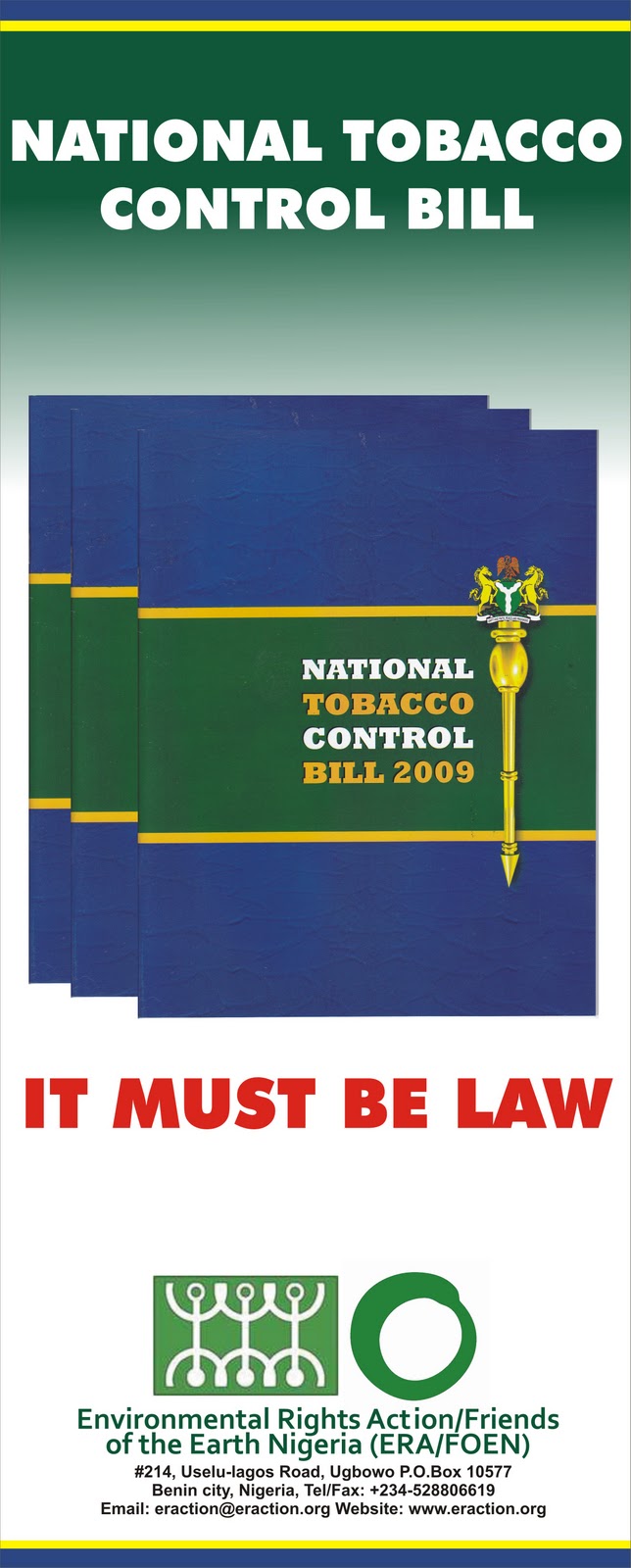The lackadaisical attitude of our lawmakers on the National Tobacco Control Bill (NTCB) has generated concern among serious-minded Nigerians within and outside the country. The Senate Committee on Health chaired by Senator Iyabo-Obasanjo Bello was given two weeks by Senate President David Mark to produce a report on the Public Hearing organised by the same Committee. But the Committee is yet to produce the report for adoption at the plenary of the Senate.
The action of the lawmakers calls for obvious questions, such as 'when would the bill be passed?' Would the law makers allow the tobacco industry to continue to exploit the innocent youths? How long would it take the lawmakers to pass a crucial bill that has to do with health? No one can deny the dangerous effects of tobacco use. According to the World Health Organisation (WHO), tobacco currently kills 5.4 million people every year globally, and if left unchecked, this number will increase to 8 million with devastating results for developing countries like Nigeria which will contribute about 70 percent of that casualty. In the 20th century, the tobacco epidemic killed 100 million people, and according to WHO estimates, it could kill one billion people in the 21st century.
The Public Hearing was an eye-opener for Nigerians, including David Mark, and participants. Over 45 Non-Governmental Organisations (NGOs), including local and international organisations, made presentations in support of the bill. Since the Public Hearing in July 2009, Nigerians and others stakeholders in public health including Babatunde Osotimehin, former health minister; Umar Modibbo, former FCT minister and Kayode Soyinka, WHO representative, among other eminent Nigerians, have waited for Senator Iyabo-Obasanjo Bello's committee to return the bill to plenary for adoption. But the wait and hope of 150 million people seem dashed.
If the bill is passed and enforced, two outcomes are possible: The level of national savings will increase and other forms of consumption expenditure will be substituted for tobacco expenditure. Studies in several countries have examined the potential economic impact of the complete elimination of tobacco use and production. The evidence shows that elimination of tobacco will not affect the economy. This is because tobacco use has many externalised costs (costs not paid for by smokers or tobacco manufacturers). This involves healthcare costs incurred by governments to take care of smoking -related diseases. When people no longer spend their money on tobacco, they will spend their money on other things. This alternative spending will stimulate other sectors of the economy. If the money is saved rather than spent, the increased savings are likely to have stimulatory macroeconomic effects.
But our government's lack of attention in calculating the economic losses of tobacco has contributed largely to the expansion of BAT in Nigeria. In 2006, a survey from 11 government- owned hospitals in Lagos State revealed that at least two persons die of a tobacco-related disease daily. It also revealed that same year, there were 9750 tobacco-related cases reported in these hospitals. To that end, the state averred that it spent N222, 000 subsidising the cost of treatment of each tobacco-related case. Each individual, the report said, also spends an additional N70, 000 treating the same disease. From the foregoing, the Lagos economy lost N2, 847,000,000. Note that this amount is higher in the northern parts of Nigeria where the smoking prevalence doubles that in the south.
The second outcome has to do with loss of production, an aspect which has not been fully addressed. There are three ways in which smoking affects production: one, it reduces life expectancy - thus the productive years of workers; secondly, it increases the number of the permanently disabled who will end up as a burden to our social system - consuming more and producing nothing. Thirdly, it increases absenteeism from work as a result of intermittent illnesses. Smoking, through its adverse health effects, reduces the quantity of goods and services produced and thus reduces the society's consumption potential.
The world is watching the efforts of those who have contributed tirelessly to this bill, and also those who would rather watch the country engulfed in a preventable epidemic. No contribution to the public health debate will be forgotten in a hurry. Nature will not forget in hurry too. To redeem our name is to save peoples' lives by passing into law the bill to regulate the activities of tobacco companies.






